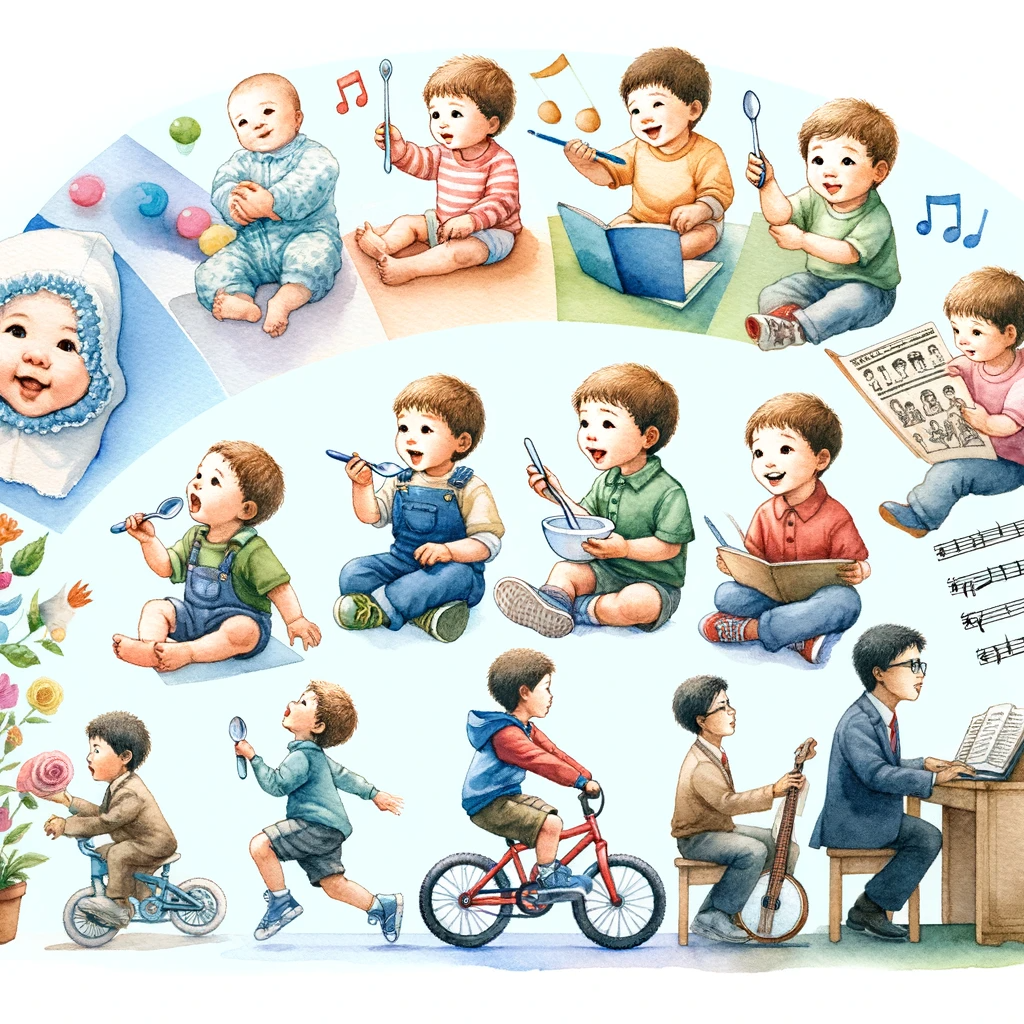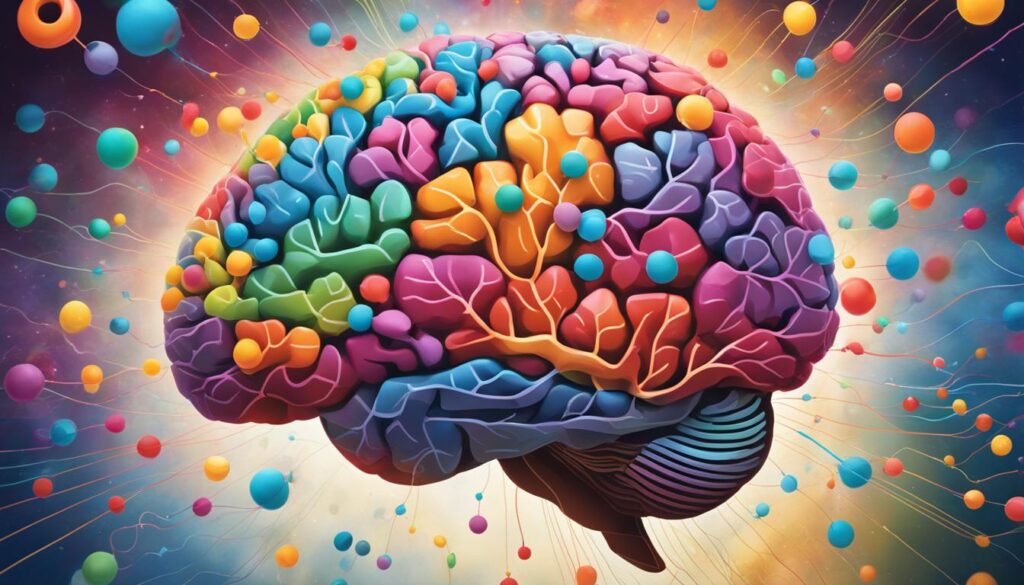By the age of 2, toddlers are reaching important milestones in their growth and development. They are becoming more independent, with a growing vocabulary and the ability to sort shapes and colors. They are also starting to show social and emotional milestones, such as copying adults and getting excited when with other children. In terms of physical development, toddlers can run, kick a ball, and climb furniture without assistance. It’s important for parents to track these milestones to ensure their child is progressing appropriately.

Key Takeaways:
- Toddlers experience important milestones in growth and development by the age of 2.
- They become more independent, develop a growing vocabulary, and can sort shapes and colors.
- Toddlers also show social and emotional milestones, such as copying adults and interacting with other children.
- In terms of physical development, toddlers can run, kick a ball, and climb furniture without assistance.
- Tracking milestones is crucial for parents to ensure their child’s progress is on track.
Social and Emotional Milestones
At 2 years old, toddlers are beginning to develop important social and emotional milestones. They are learning how to connect with the people around them and show an interest in social interactions. Toddlers at this age may start to copy adults and other children, imitating their actions and words. This imitation is a key component in their development as it allows them to understand how to behave and communicate in different social situations.
Toddlers at 2 years old also start to become more independent, asserting themselves and testing boundaries. This newfound independence can sometimes lead to defiance as they strive to assert their individuality. It’s important for parents to provide guidance and support during this time, helping their child navigate these social and emotional changes.
Engaging in play and conversations with your child is an excellent way to foster their social and emotional development. During playtime, encourage your child to interact with their peers and siblings, promoting collaboration and cooperation. This will help them develop their social skills while also learning to share and take turns.
Conversations are another important tool for connecting with your child. Take the time to listen to their thoughts and feelings, asking open-ended questions to encourage them to express themselves. This will help them develop their communication skills and strengthen their emotional bond with you.
“Play is often talked about as if it were a relief from serious learning. But for children, play is serious learning. Play is really the work of childhood.”
Fostering Social and Emotional Development
Here are some tips to support your toddler’s social and emotional milestones:
- Encourage social interactions through playdates or visits to the park.
- Model positive behavior and emotional regulation.
- Provide opportunities for your child to engage in imaginative play.
- Read books that explore emotions and social situations.
- Practice empathy by discussing feelings and perspectives.
Language and Communication Milestones
By the age of 2, toddlers are reaching important language and communication milestones. Their speech development progresses significantly during this time, and their vocabulary grows rapidly. Here are some key milestones to look out for:
- Forming short sentences: Toddlers can now string together two to four words to express their thoughts and needs. They may say phrases like, “Mommy book” or “More milk.”
- Pointing to objects when named: Toddlers can recognize and understand the names of familiar objects. They can point to these objects when prompted, showing their expanding vocabulary.
- Recognizing familiar people: Toddlers can now identify and name important people in their lives, such as family members, friends, and pets.
- Repeating words they have overheard: Toddlers have a growing ability to imitate and repeat words they have heard, even if they don’t fully understand the meaning behind them.
- Following simple instructions: Toddlers can understand and follow basic instructions, such as “Give me the ball” or “Put your shoes on.”
To foster their language development, it is essential to engage in conversation with your toddler. Talk to them about the things you see, ask them open-ended questions, and encourage them to express their thoughts and feelings. This active engagement will help expand their vocabulary and refine their communication skills.
“Language is the key to unlocking a toddler’s thoughts and emotions. By nurturing their communication skills, we empower them to express themselves and engage with the world around them.”
Tips to enhance language and communication milestones:
- Read together: Make reading a daily habit and encourage your toddler to participate by pointing, naming objects, and asking questions about the story.
- Expand their vocabulary: Introduce new words during everyday activities and outings. Describe objects, actions, and emotions to help your toddler make connections.
- Engage in pretend play: Encourage your toddler to use words and phrases during imaginative play. This helps them practice language skills in a fun and interactive way.
- Provide a supportive environment: Create a safe and nurturing space for your toddler to express themselves. Be patient and attentive when they are trying to communicate.
- Use gestures and facial expressions: Utilize non-verbal cues to enhance understanding and reinforce the meaning behind words. This helps toddlers grasp language in a multi-dimensional way.
| Milestone | Description |
|---|---|
| Forming short sentences | Toddlers can express their thoughts and needs using two to four words. |
| Pointing to objects when named | Toddlers can recognize and understand the names of familiar objects and indicate them. |
| Recognizing familiar people | Toddlers can identify and name important people in their lives. |
| Repeating words they have overheard | Toddlers can imitate and repeat words they have heard, even without full comprehension. |
| Following simple instructions | Toddlers can understand and carry out basic instructions. |
Brain Development Milestones
Toddlers at 2 years old are experiencing significant brain development. During this stage, they are acquiring essential cognitive skills and problem-solving abilities that lay the foundation for future learning and development.
Building Blocks of Cognitive Development
One of the key brain development milestones for toddlers is their ability to sort shapes and colors. Through these activities, they develop their visual perception and learn to categorize objects based on their attributes. This skill not only enhances their cognitive abilities but also helps them understand the world around them.
Finding Hidden Treasures
Toddlers also start to demonstrate their problem-solving skills by finding hidden objects. This activity promotes their ability to think critically, develop spatial awareness, and enhance their memory. Encouraging them to engage in treasure hunts or seek out objects in different locations can further boost their cognitive development.

At this stage, toddlers begin to engage in simple make-believe games. These imaginative play activities foster their creative thinking, social skills, and cognitive flexibility. It allows them to explore different roles and scenarios, enhancing their problem-solving abilities and expanding their cognitive horizons.
Building Towers, Building Skills
Building towers with blocks is another important milestone in a toddler’s brain development. It requires hand-eye coordination, fine motor skills, and spatial understanding. As they stack blocks to create a tower, toddlers learn cause and effect, develop patience, and enhance their problem-solving skills.
| Brain Development Milestones | Cognitive Development in Toddlers | Problem-Solving Skills |
|---|---|---|
| Sorting shapes and colors | Enhancing visual perception and categorization skills | Developing critical thinking abilities |
| Finding hidden objects | Promoting problem-solving, spatial awareness, and memory | Boosting cognitive development |
| Engaging in imaginative play | Fostering creativity, social skills, and cognitive flexibility | Expanding problem-solving abilities |
| Building towers with blocks | Improving hand-eye coordination and fine motor skills | Enhancing cause-and-effect understanding |
Physical Development Milestones
As toddlers reach the age of 2, they embark on a journey of rapid physical development. Their motor skills improve significantly, enabling them to engage in various activities that promote strength and coordination.
Toddlers at this stage can run confidently, displaying their newfound speed and agility. They also begin to master the art of balance, allowing them to climb furniture and playground structures without needing assistance. This newfound independence brings a sense of accomplishment and joy to both the child and their parents.
In addition to running and climbing, toddlers also show progress in their fine motor skills. They are now able to make or copy straight lines and circles, showcasing their growing dexterity and control. Encouraging these skills can be as simple as providing opportunities for your child to turn the pages of a book or use utensils for self-feeding, even if it results in a few spills along the way.
By actively supporting and facilitating their physical development milestones, parents can ensure that their toddlers not only enjoy the benefits of increased activity but also lay a solid foundation for a lifetime of healthy habits and physical well-being.
FAQ
What are some important milestones for toddlers?
Important milestones for toddlers include social and emotional development, language and communication skills, cognitive development, and physical growth and motor skills.
How can parents track their toddler’s milestones?
Parents can track their toddler’s milestones by observing their progress in social interactions, language development, cognitive abilities, and physical skills. They can also consult developmental checklists or speak with their child’s pediatrician.
What social and emotional milestones can a 2-year-old toddler reach?
A 2-year-old toddler may start to copy adults and other children, showing an interest in social interactions. They may also become more independent and may exhibit defiant behavior as they explore boundaries.
How can parents support their toddler’s social and emotional development?
Parents can support their toddler’s social and emotional development by engaging in play and conversations, encouraging collaboration with others, and fostering a sense of belonging and empathy.
What communication milestones can a 2-year-old toddler achieve?
At 2 years old, toddlers can form short sentences with two to four words, point to objects when named, recognize familiar people, repeat words they have overheard, and follow simple instructions.
How can parents encourage their toddler’s language and communication skills?
Parents can encourage their toddler’s language and communication skills by talking to them about the things they see, engaging in conversations, reading books, and consistently exposing them to new words and ideas.
What cognitive milestones can a 2-year-old toddler reach?
A 2-year-old toddler can sort shapes and colors, find hidden objects, complete sentences in familiar books, engage in simple make-believe games, and build towers with blocks.
How can parents support their toddler’s cognitive development?
Parents can support their toddler’s cognitive development by providing opportunities for exploration, problem-solving, and imaginative play. This can include activities like hiding objects for them to find, giving hints, and offering age-appropriate toys and puzzles.
What physical milestones can a 2-year-old toddler achieve?
At 2 years old, toddlers can run, kick a ball, throw a ball overhead, climb furniture without assistance, and make or copy straight lines and circles.
How can parents encourage their toddler’s physical development?
Parents can encourage their toddler’s physical development by providing safe opportunities for them to challenge their fine motor skills, such as turning the pages of a book, using utensils with some spills, and engaging in outdoor play activities that involve running or climbing.
